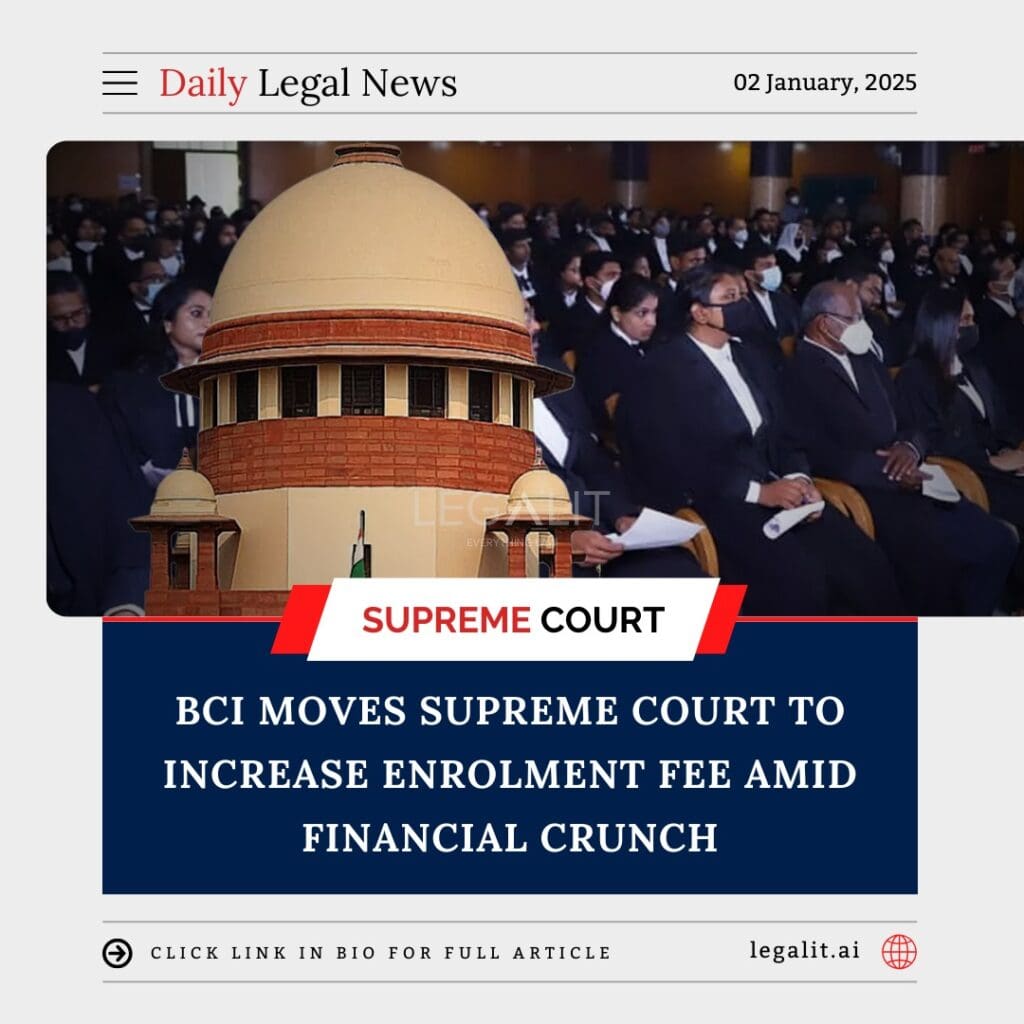
The Bar Council of India (BCI) has approached the Supreme Court, requesting an increase in the enrolment fee for advocates, citing a growing financial crunch and the need to address administrative challenges. The petition highlights the increasing operational costs faced by the BCI in managing and regulating the legal profession, including the rising expenses of the Bar Council’s infrastructure and services.
1. BCI’s Petition for Fee Hike
The Bar Council of India has filed a petition urging the Supreme Court to approve an increase in the enrolment fee for aspiring lawyers. According to the petition, the existing enrolment fee structure is insufficient to cover the expenses incurred by the BCI in the regulation, administration, and facilitation of legal education and professional standards across India.
The BCI’s current fee structure, which has remained largely unchanged for years, no longer meets the demands of modern legal education and practice. The body has pointed out that financial resources are increasingly limited, affecting its ability to manage the large volume of enrolments and provide necessary services to the legal community.
2. Reasons for Financial Crunch
Several factors contribute to the financial difficulties faced by the BCI:
- Rising Operational Costs: The cost of infrastructure, maintenance, and salaries has been steadily rising, making it difficult for the BCI to meet its financial obligations.
- Increased Number of Enrolments: With more law graduates entering the profession each year, the BCI has been overwhelmed with processing a larger number of enrolments.
- Regulatory Expenses: The BCI is responsible for overseeing the quality of legal education, monitoring legal practice standards, and implementing various initiatives, all of which require financial backing.
- Limited Funding Sources: The BCI, as a regulatory body, operates without a direct revenue generation mechanism, relying mainly on enrolment fees for sustenance.
3. Proposed Changes to Enrolment Fee
The BCI’s proposal suggests a revision of the enrolment fee to better align with current economic conditions and the needs of the legal profession. While the exact amount for the proposed fee increase has not been specified, the Council has emphasized the necessity of the hike to ensure the sustainability of its activities and improve the services it offers to lawyers across the country.
This proposed increase has sparked debates within the legal community, with some supporting the move as essential for the growth and proper regulation of the profession, while others express concern over the burden it could impose on newly enrolled advocates who are already facing financial constraints.
4. Impact on Aspiring Advocates
An increase in the enrolment fee may have several implications for aspiring lawyers:
- Financial Strain on New Graduates: Law graduates, many of whom are burdened by student loans or lack the financial resources to immediately practice law, may find the increased fee a barrier to entering the profession.
- Increased Professional Costs: The rise in enrolment fees could contribute to an overall increase in the costs of practicing law, potentially affecting young and newly enrolled lawyers in particular.
- Better Services: On the positive side, a fee increase could provide the BCI with additional funds to enhance services such as legal aid programs, educational initiatives, and the maintenance of professional standards.
5. Court’s Role in Decision-Making
The Supreme Court’s involvement in this matter highlights the importance of balancing the need for financial sustainability with the accessibility of the legal profession. While the Court is likely to consider the BCI’s financial constraints, it will also have to weigh the potential impact on newly enrolled advocates. The Supreme Court will evaluate the merit of the petition and its long-term effects on the legal profession and aspiring lawyers.
Conclusion
The BCI’s move to the Supreme Court for an increase in the enrolment fee reflects the growing financial challenges faced by the regulatory body in managing the legal profession. While the fee hike may help the BCI address its financial crunch, it raises concerns about the affordability of law practice for aspiring advocates. The Court’s decision will be crucial in determining how the profession evolves to meet both regulatory needs and the financial realities of those entering the legal field.